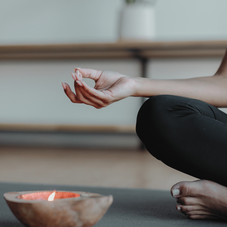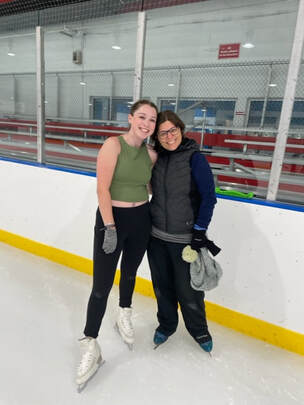 Skater practicing candle gazing to improve focus Skater practicing candle gazing to improve focus Right now in one of my weekly yoga classes for figure skaters, we have a hodge podge of injuries. One skater has a hairline fracture of the wrist, another with a strained foot, and another with a strained hamstring. Then, I have my own injury that has plagued me for months–a gluteus medius tear that will be surgically repaired in a few days. Thank goodness the days of “no pain no gain” in youth sports in the US are disappearing (even if that attitude still persists in many parts of society and in many sports cultures across the world). As my teacher at Yoga East always say, “no pain, no pain” is a much better way to be. Of course, sometimes kids say “owww, it hurts” every time you ask them to use a muscle, and learning to distinguish between effort and the accompanying discomfort vs. actual pain is part of the process of being human and especially of learning to be an athlete. This need for awareness is a major reason why I believe that continuing to practice yoga (in an appropriate, non-harmful way) while injured is so important. I give options to all of the students, especially those with injuries, and let them know that they are in charge–if they don’t feel comfortable trying something or begin to feel any pain, then we need to stop and find a different option for them. We also have been incorporating more exercises for the other limbs of yoga (yamas and niyamas, pranayama, dharana, pratyahara), which are crucial for a well-rounded practice. After all, the essence of practice is simply exploration and awareness of the mind and body, not perfection.
0 Comments
7/1/2023 0 Comments Don't Let These Five Things Stand in the Way of Your Happy, Successful Figure Skating Journey I said to a friend and colleague the other day that when you have a Type A skater who is obsessed with details and needs everything to be perfect, the coach’s job is to help them lighten up a little–to see the beauty and growth in the imperfections; and when you have a skater that doesn’t care about details and just plows ahead “fast and bad” over and over, the coach’s job is to help them see the beauty and growth in the details. As with everything, there should be a happy medium. Or, as the same friend said her mother always says, “Everything in moderation.’ Even the most competitive skaters can’t even experience long-term success if they are panicked about being uncomfortable with making mistakes. And even the most recreational skater can’t be happy long-term if they stop making progress because they won’t slow down to pay attention to the details. Like with everything in life, the goal in skating needs to be a balanced path, and what that looks like will be different for each skater and family. We are each born with a unique set of characteristics and personality traits, so regardless of the formula each coach or family chooses, we all must learn to harness our strengths and develop our weaknesses in order to find that balance. This is what the practice of yoga is all about–finding the right balance of the right ingredients to calm the fluctuations of the mind. For skaters, this translates as learning to train smarter, to ultimately skate better, and enjoy the process more. If yoga is so helpful in this pursuit, then why isn’t everyone doing it? Because not everyone has the same experience with yoga! In my time teaching yoga to figure skaters, these are some of the most common barriers that stop skaters from connecting with yoga and experiencing true transformation. |
Author // the skating yogiMy name is Sarah Neal. I have been immersed in the world of figure skating for over four decades. I have seen firsthand the abuse that happens at the higher levels of our sport and experienced how that trickles down into unhealthy training practices and habits at the grassroots. I have seen this play out in the operations of the very institutions that control our sport. Whether for a profession or hobby, pursuing skating should be a joyful, rewarding process, an opportunity for athletic and personal growth, and a place to build lasting friendships. Archives
March 2024
CategoriesAll Athlete Well Being Athlete Well-Being Deep Connections Embodied Movement And Meditation Practices Life After Competition Mindful Living |
Search by typing & pressing enter

 RSS Feed
RSS Feed